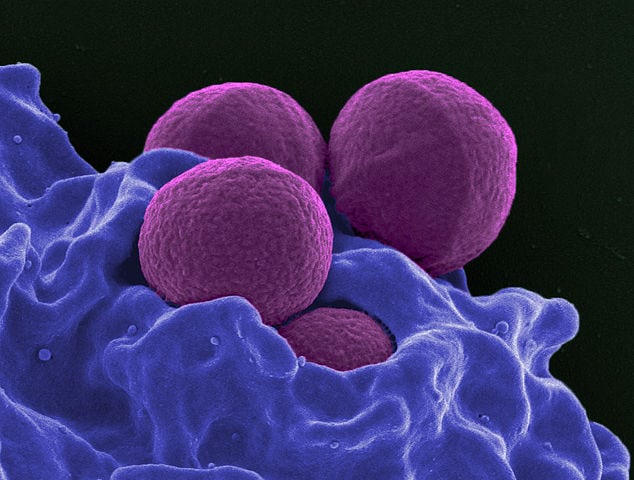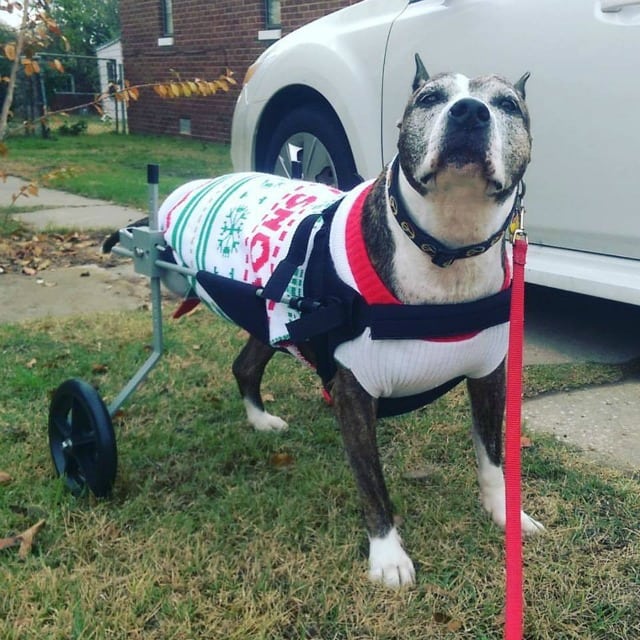Tripawds Three Legged Dog & Cat Forum Archives
Tripawds is your home to learn how to care for a three legged dog or cat. Explore 17+ years of forum archives for stories and answers to questions about dog leg amputation, and cat amputation recovery. Enjoy fresh discussion and connect with members in the new Tripawds Support Circle.
Join The Tripawds Community
Register your free account to join the Tripawds Support Circle. Connecting with members and getting the support you need is now easier than ever with the Circle app!
Easy Photo Upload
Private Messaging
Subscribe to Topics.
Live Chat and much more!
Forums Locked: Search archives for answers & join Tripawds Support Circle to keep discussion going!
This community is no stranger to MRSA in amputee dogs and cats. Known as "methicillin-resistant staphylococcus aureus," MRSA is a bacterial skin infection that strikes pets (and people) who have weakened immune systems. It's not common, but we do see it here.
Both people and pets carry MRSA germs every single day, but when the body takes a beating, that's when we're at risk for MRSA germs to rapidly colonize and cause problems. The condition resists most antibiotics and without prompt, appropriate treatment can be fatal for the patient. If your pet hasn't had amputation surgery yet, ask your vet about amputation incision site wound care. Knowing what a normal dog and cat amputation incision site looks like is critical. Any abnormalities should be reported to your vet immediately. Here's why.
How is MRSA in Amputee Dogs and Cats Treated?


Even if an amputation incision has an infection, your vet can't diagnose MRSA just by looking at it. In an excellent MRSA fact sheet by Kingsbrook Animal Hospital in Frederick, Maryland, vets explain how MRSA is transmitted, diagnosed and treated:
Because MRSA can cause so many different kinds of infections, and it’s impossible to tell for sure what kind of bacteria are involved based on how the infection looks, MRSA is usually diagnosed based on bacterial culture, which can take 1-3 days to complete. Molecular tests are now being used which can detect MRSA more rapidly (hours versus days), but these tests are not used in animals.
The body site most likely to be colonized with MRSA in humans is the nose, so a nasal swab is often cultured to check for MRSA colonization. The ideal body site to culture in colonized animals is unknown, but swabs are usually taken of the nose and the area around the anus in pets. READ MORE: "MRSA and Cats"
Tripawds Can Beat MRSA After Amputation Surgery
Once the type of MRSA bacteria is confirmed, your vet will prescribe the antibiotic that's got the best odds at controlling it. Tripawds like Ty, Bud and Sketch are dogs who beat MRSA thanks to fast-acting veterinarians. Most recently, Izzi was diagnosed with MRSA after her amputation surgery.
She came home on a Sunday and by Thursday we were back at the vet because she had a small opening near her stitches that didn't look right to me. . . after a few more days the wound was getting much worse and the drainage was getting thick and cloudy. Back to the vet we went. It was determined that she had contracted an antibiotic-resistant infection which would require much more serious treatment.
Izzi's veterinarian prescribed Chloramphenicol, a powerful broad-range antibiotic that's so strong it can fight conditions like meningitis and encephalitis. According to the animal compounding pharmacy Diamondback Drugs, Chloramphenicol for treating MRSA in dogs and cats "is preferred over other antibiotics, as it has the ability to pass deeply through cell membranes and other purulent material to attack bacteria residing in places other antibiotics cannot reach."
Thankfully the drug worked and Izzi bounced back. But it wasn't easy.
"The new pills started helping pretty rapidly and the wound started to close up but she felt miserable. It was awful. I had to give the new pills strictly every 8 hours and we had to do laser therapy every other day. She started picking the pills out of everything because they were huge and impossible to hide. So every 8 hours became a battle of wits with me trying to trick her into eating a laced hot dog and her demanding about 3 hot dogs before she'd accept the pill...but finally after 10 days of therapy the wound is looking fantastic so she was able to get her stitches out yesterday! She's been off those antibiotics for a couple days too and I can tell she feels 100% better. She's back to her old self again and I'm so relieved."
If you suspect that your recovering Tripawd dog or cat has an infected incision site, call your vet immediately. Even when your vet prescribes an antibiotic, insist on a MRSA culture. It could save your pet's life.
More About MRSA in Tripawd Dogs and Cats
Sketch Beats MRSA
Infection with Amikacin Topical Spray
Get the MRSA
Facts for Dogs, Cats and People
Chloramphenicol Medication For Pets
Posts about MRSA
in Dogs and Cats from Animal Medical Center New York
MRSA
and Cats, Kingsbrook Animal Hospital
Symptoms of MRSA Infection in Dogs, VetInfo
Tripawds Founders Jim and Rene
tripawds.com | tripawds.org | bemoredog.net | triday.pet
1 Guest(s)

 Log In
Log In Members
Members

 Read the original blog post
Read the original blog post


 Offline
Offline








